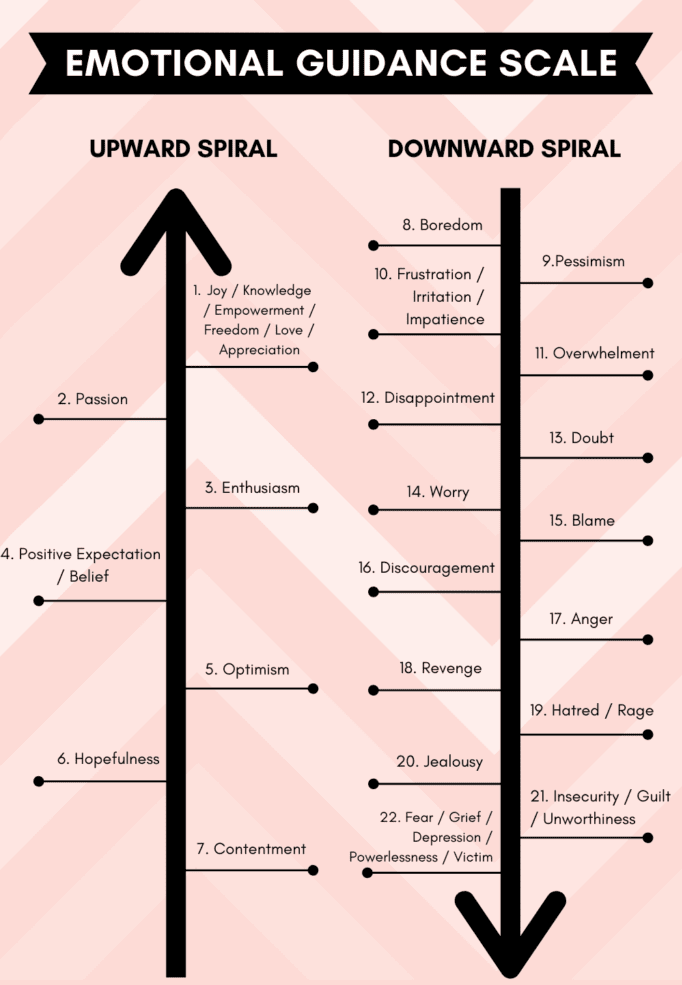For those of you following my posts and articles, you will know that I am passionate about people in business, in the sense that all businesses function based on how well the people function. Especially the key people in smaller business, those companies/businesses under, say, £10 million turnover.
My point is that if the people improve, in any way, then the business is likely to improve. So, we focus more on people development than business development.
This is why I have learned about self-actualisation, as it allows me to help business owners elevate themselves and this translates to better business management. In theory that will lead to faster growth, more security, and higher profits, and eventually a more valuable business when it is sold or passed on in some way.

This is the emotional guidance scale, and this has many possible aspects to it to comment on, and several connotations in different areas of life.
I would like to focus on this strictly in terms of how I see its relevance for business people, building on the core theme I have described above.
The more time any business owner experiences with the higher level emotions as their core emotional “state”, the better.
Decision making is improved when we feel good, as we have more clarity and confidence.
Sales are likely to be higher when the sales person is happier, more energised, and emits a positive front.
Staff relations will always be stronger if the “boss” is more relaxed. And staff will be more motivated.
These three examples emphasise how important it is for each of us to focus on our emotional state, and to do everything we can to step up the emotional ladder.
One way of doing this, and by far the simplest, is to become aware of the ladder, and self-aware where we tend to sit on it.
All of us will experience variable emotions at different times, and will fluctuate. It therefore becomes the case of asking ourselves where do we tend to spend the most time on the scale or ladder? What are our predominant emotional states?
If we are constantly doubting ourselves, worried or feeling guilty, with the odd burst of joy and optimism, then we can categorise ourselves as tending to be low on the scale.
If we are more often confident, happy, positive, and passionate, but dip occasionally into fear and frustration, then we are high on the scale.
Awareness and self-introspection lead us to consciously adjust as we need to.
This is easy in theory, tricky in practice, and requires patience and persistence.
The prize – or reward – is immense, if we can achieve progress and move up the ladder, there is ample evidence this produces improved results.
The American scientist, speaker and author Bruce Lipton does provide a formula for us to practice, and he knows this works. Basically just tell yourself over and over you are ‘something’ and it eventually comes to pass. So, if you are down most of the time (lower on the ladder) and feel unhappy, then tell yourself all day, every day “I am happy”, force yourself to feel happy, however unnatural or challenging, and then sooner or later you wake up one morning and you are happy. And you stay happy from then on, because the habitual process you have started becomes your new state. It is a way of reprogramming the subconscious.
You can apply this to any of the emotions, such as happiness, joy, optimism and passion. Just keep reinforcing and work through the stages where it doesn’t manifest – until it does.
Another way is to meditate, and to try such things as walking meditation, as the natural act of walking (especially in nature) stimulates awareness and provides the perfect opportunity for you to train your mind.
We are more than what we are, as we all have untapped potential, and because our state is not static, we can change to produce a higher score on the emotional scale, and when we are in business, we know this makes us greater business people, so the link is solid.
Take your time to work on where you are on the scale, and this will make you better as an individual, which will make your business stronger.




